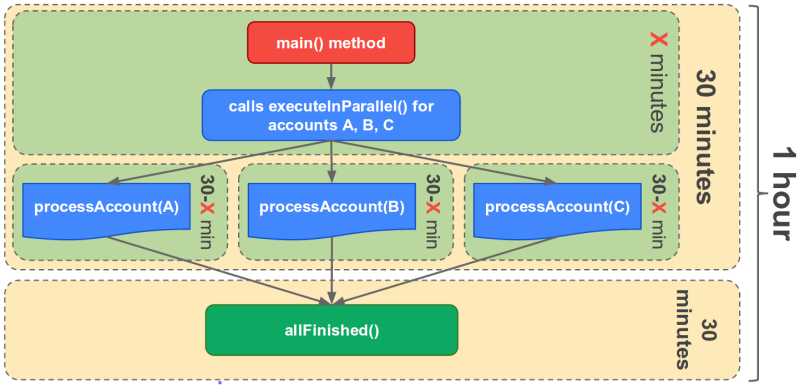Page Summary
-
Google Ads scripts and Ads Manager scripts have execution time limits, typically 30 minutes, though Ads Manager scripts using
executeInParallelwith a callback can run up to 60 minutes. -
Iterator and selector limits exist for Google Ads accounts, such as a default of 50,000 results for iterators and 10,000 IDs for selectors, while manager accounts have per-account quotas and limits on parallel processing.
-
Bulk uploads are limited by file size and row count, and upload jobs have a two-hour timeout.
-
Underlying Google Apps Script services impose daily quotas and hard limits on features.
-
There is a limit of 250 authorized scripts per account using OAuth2.
This page outlines various limits and limitations in Google Ads scripts that you should be aware of. These limits can change at any time without warning, so ensure that your scripts are flexible and contain error handling.
Execution time limits
Google Ads scripts
Google Ads scripts for advertiser accounts can execute for a maximum of 30 minutes, after which they will be cancelled. All of the changes made before the script was cancelled will be applied.
Ads Manager scripts
Ads Manager scripts can normally execute for a maximum of 30 minutes, after
which they will be cancelled. However, if an Ads Manager script uses the
executeInParallel
method to process accounts in parallel and specifies a callback method, then it
can execute up to a maximum of 60 minutes before being cancelled. This is
illustrated in the following figure, where processAccount is the parallel
function, and allFinished is the callback method when calling
executeInParallel.

All of the changes made before the script was cancelled will be applied.
Entity limits
Scripts of Google Ads accounts
A single iterator will default to at most 50,000 results returned. You can modify this by calling
withLimit()on the selector.A single selector can handle at most 10,000 IDs in
selector.withIds(). If 10,000 or more IDs are specified,selector.get()will throw a runtime error. Similarly, specifying anId IN [LIST]condition with a list of IDs10,000 will result in a runtime error.
Logging output will be truncated at 100Kb. A warning will be logged if that happens.
Scripts of manager accounts
Each account processed by an Ads Manager script gets its own quota as listed in the previous section.
When using the
executeInParallelmethod, a script can process up to 50 accounts.The
processAccountmethod fromexecuteInParallelcan return up to 10MB of data.
Bulk upload limits
The upload file is limited to 50MB and one million rows, and will be rejected upon submission if it exceeds these limits.
An upload job times out after two hours and the job will stop processing any remaining data from the uploaded file.
Quotas for Google services
The underlying Google Apps Script services impose daily quotas and hard limits on some features. See a list of these quotas and accompanying exception messages.
Authorized scripts
OAuth2 is used to authorize scripts. Each account has a limit of 250 authorized scripts. Beyond that limit, one of the previously authorized scripts will be deauthorized. This is only temporary, and the script can be reauthorized the next time it is opened.
If you are frequently running into this limit, you should consider using multiple user accounts to authorize different sets of scripts.
Video and shopping campaigns
The standard campaign selector (AdsApp.campaigns().get()) will filter
out video and
shopping campaigns
from the results. Use the dedicated campaign selectors instead:
